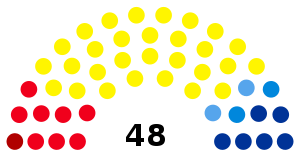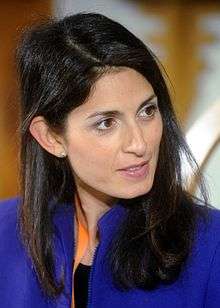2016 Rome municipal election
Municipal elections were held in Rome in June 2016, following the resignation of the former Mayor of Rome Ignazio Marino.[1] The first round of voting on 5 June producing no outright winner, resulting in a run-off election on 16 June between Virginia Raggi of the Five Star Movement (M5S) and Roberto Giachetti of the Democratic Party.[1] Raggi won with two-thirds of the vote,[2] and her party won a majority on the Rome City Council with 29 of the 48 seats.[3] The results were widely reported as a major breakthrough for the Five Star Movement, which had previously been seen as a protest party rather than a significant political force.[4][5] At the same round of elections, M5S also won in the Turin elections.[4]
| ||||||||||||||||||||||||||||
48 seats to the Rome municipal council 25 seats needed for a majority | ||||||||||||||||||||||||||||
|---|---|---|---|---|---|---|---|---|---|---|---|---|---|---|---|---|---|---|---|---|---|---|---|---|---|---|---|---|
| ||||||||||||||||||||||||||||
 First round results by municipi | ||||||||||||||||||||||||||||
 Second round results by municipi | ||||||||||||||||||||||||||||
| ||||||||||||||||||||||||||||
Voting system
The voting system is used for all mayoral elections in Italy, in the city with a population higher than 15,000 inhabitants. Under this system voters express a direct election for the mayor or an indirect election voting for the party of the candidate's coalition. If no candidate receives 50% of votes, the top two candidates go to a second round after two weeks. This gives a result whereby the winning candidate may be able to claim majority support, although it is not guaranteed.[6]
The election of the City Council is based on a direct choice for the candidate with a preference vote: the candidate with the majority of the preferences is elected. The number of the seats for each party is determined proportionally.[6]
Parties and candidates
This is a list of the parties (and their respective leaders) which participated in the election.
| Political force or alliance | Constituent lists | Leader | ||
|---|---|---|---|---|
| Democratic Party | ||||
| Democrats and Populars | ||||
| Federation of the Greens | ||||
| Italy of Values | ||||
| Italian Radicals | ||||
| Italian Socialist Party | ||||
| Brothers of Italy | ||||
| League with Salvini | ||||
| Five Star Movement | ||||
| Forza Italia | ||||
| Marchini List | ||||
| Popular Rome | ||||
| Storace List | ||||
| Italian Left | ||||
Opinion polling
Results
First round
Raggi received the most votes in the first round but did not secure the majority required for an outright victory, with voting proceeding to a second, run-off round.[2]
 | |||||
| Candidates & parties | Votes | % | Seats leaders |
Seats | |
|---|---|---|---|---|---|
| Virginia Raggi | 461,190 | 35.26 | – | 29 | |
| Five Star Movement | 420,435 | 35.32 | → | 29 | |
| Roberto Giachetti | 325,835 | 24.91 | 1 | 7 | |
| Democratic Party | 240,637 | 17.19 | → | 6 | |
| Rome Return Rome | 49,457 | 4.15 | → | 1 | |
| Democrats and Populars | 17,378 | 1.46 | → | – | |
| Italian Radicals | 14,165 | 1.19 | → | – | |
| Secular Civic Socialists | 7,716 | 0.64 | → | – | |
| Italy of Values | 3,085 | 0.25 | → | – | |
| Giorgia Meloni | 269,760 | 20.62 | 1 | 5 | |
| Brothers of Italy | 146,054 | 12.27 | → | 4 | |
| With Meloni Mayor | 40,441 | 3.39 | → | 1 | |
| League with Salvini | 32,175 | 2.70 | → | – | |
| Italian Liberal Party | 10,749 | 0.90 | → | – | |
| Popular Federation | 4,146 | 0.34 | → | – | |
| Alfio Marchini | 143,829 | 10.99 | 1 | 3 | |
| Marchini List | 56,686 | 4.76 | → | 2 | |
| Forza Italia | 50,842 | 4.27 | → | 1 | |
| Popular Rome | 15,453 | 1.29 | → | – | |
| Storace List | 7,391 | 0.62 | → | – | |
| Christian Revolution | 1,747 | 0.14 | → | – | |
| Liberal Network | 1,225 | 0.10 | → | – | |
| Italian Construction Movement | 1,124 | 0.09 | → | – | |
| Stefano Fassina | 58,498 | 4.47 | 1 | – | |
| Left For Rome | 46,774 | 3.93 | → | – | |
| Fassina Mayor | 6,006 | 0.50 | → | – | |
| Simone Di Stefano | 14,865 | 1.13 | – | – | |
| CasaPound Italia | 14,118 | 1.18 | → | – | |
| Alessandro Mustillo | 10,371 | 0.79 | – | – | |
| Communist Party | 9,917 | 0.83 | → | – | |
| Dario Di Francesco | 8,021 | 0.61 | – | – | |
| Talking Cricket List | 4,772 | 0.39 | → | – | |
| Pensioners' Union | 1,131 | 0.09 | → | – | |
| Movement for Rome | 1,032 | 0.08 | → | – | |
| Centre League | 719 | 0.06 | → | – | |
| With Joy – Go Italy! | 281 | 0.02 | → | – | |
| Mario Adinolfi | 7,992 | 0.61 | – | – | |
| The People of Family | 7,480 | 0.62 | → | – | |
| Carlo Rienzi | 2,760 | 0.21 | – | – | |
| Codacons For Rome | 2,578 | 0.21 | → | – | |
| Alfredo Iorio | 2,641 | 0.20 | – | – | |
| Fatherland | 2,576 | 0.21 | → | – | |
| Fabrizio Verduchi | 1,310 | 0.10 | – | – | |
| Christian Italy | 1,185 | 0.09 | → | – | |
| Michael Maritato | 873 | 0.06 | – | – | |
| Assotutela | 878 | 0.07 | → | – | |
| Total | 1,307,945 | 100.00 | 4 | 44 | |
| Source: Ministry of the Interior | |||||
Second round
First-placed Raggi and second-placed Giachetti contested the run-off second round of voting. Raggi was elected, receiving over 67% of the vote.[2]
| Candidate | Votes | % | |
|---|---|---|---|
| Virginia Raggi | 770,564 | 67.15% | |
| Roberto Giachetti | 376,935 | 32.85% | |
| Total | 1,147,499 | 100.00 | |
| Source: Ministry of the Interior | |||
Maps
The 10th municipi did not hold a municipal election, though it voted for the mayoral race.
 Result by municipi of the first round of the mayoral election
Result by municipi of the first round of the mayoral election Result by municipi of the second round of the mayoral election
Result by municipi of the second round of the mayoral election Result of the first round of the municipal elections
Result of the first round of the municipal elections Result of the second round of the municipal elections
Result of the second round of the municipal elections
See also
- Municipal elections in Rome
References
- Rosie Scammell, "Rubbish on the streets, corruption in the air: Rome looks for a clean-up candidate", The Guardian, 12 June 2016
- "Five Star Movement candidate Virginia Raggi could become Rome's mayor". The Age. 5 June 2016. Retrieved 11 June 2016.
- "Comunali [Scrutini] Comune di ROMA - Elezioni del 19 giugno 2015 (ballottaggio)". Dipartimento per gli Affari Interni e Territoriali. Ministero Dell'Interno. Archived from the original on 30 June 2016. Retrieved 20 June 2016.
- Rosie Scamell (20 June 2016). "Anti-establishment candidates elected to lead Rome and Turin". The Guardian. Retrieved 20 June 2016.
- John Phillips (20 June 2016). "Rome elects first female mayor in breakthrough for Five Star Movement". The Telegraph. Retrieved 20 June 2016.
- "ELEZIONI AMMINISTRATIVE 2016 - IL DOSSIER" (PDF). Ministry of Interior. Retrieved 20 June 2016.

